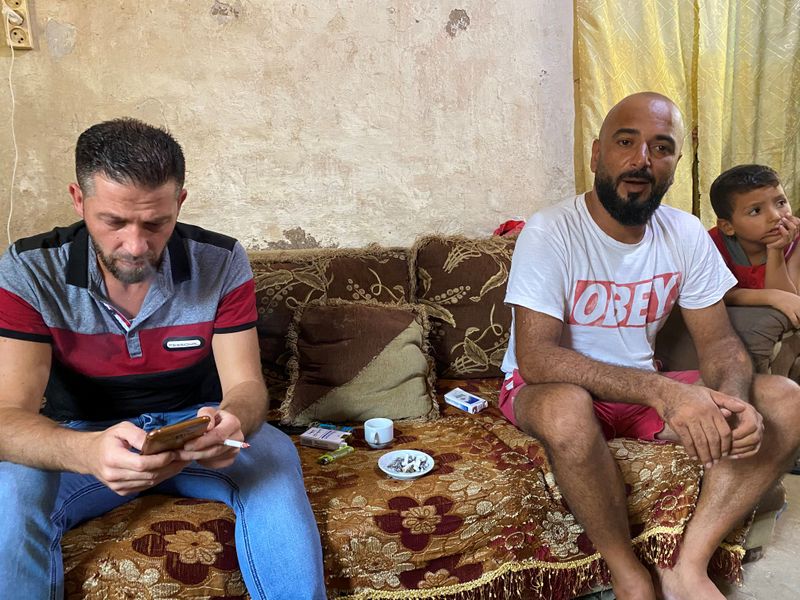By Raya Jalabi
TRIPOLI, Lebanon (Reuters) - For years, small boats have left northern Lebanon's coast, packed with desperate migrants hoping to reach European shores. Until recently, they carried mostly Syrian and Palestinian refugees. But with Lebanon in freefall, its citizens have begun joining their ranks in larger numbers.
Mohammad Ghandour never thought he'd be one of them. But he said Lebanon's economic crisis, which has crashed the Lebanese pound and left him unable to feed his seven children, gave him no choice.
"In Lebanon, we are being killed by poverty," Ghandour told Reuters this week, from his mother's cramped three-room apartment where he was staying with 12 other family members. He was back in Tripoli, one of Lebanon's poorest cities, after being sent back by Cyprus.
"This is worse than war … My children will either die on the streets or become criminals to survive.
Ghandour, 37, is one of dozens of Lebanese who've attempted the journey since late August, when rights groups say a rise in the number of boats leaving Lebanon began. Exact figures are hard to come by, but the United Nations Refugee Agency (UNHCR) has tracked 21 boats leaving Lebanon between July and Sept. 14. The previous year, there were 17 in total.
The increase has worried Cypriot authorities, especially given the global pandemic. The island is the closest European Union member state to the Middle East and has seen a gradual rise in arrivals of undocumented migrants and refugees in the past two years, as other routes have become more difficult to cross.
After 28 hours lost at sea, Ghandour said his boat, carrying his wife, children and other relatives, arrived on a beach near the seaside resort of Larnaca. He said his family was detained in a camp for several days, tested for Covid-19 and prevented from lodging a formal claim for asylum before being sent back to Lebanon.
"I didn't think they would send us back," he said. "They should have just let us die in the water. It's better than coming back here."
Cypriot authorities said about 230 Lebanese and Syrians were sent back to Lebanon by sea in early September. They had arrived in Cyprus on five boats during the previous weeks.
"Following our government's orders and after consultations between the two governments (Cyprus and Lebanon) we safely returned them on September 6, 7 and 8," Stelios Papatheodorou, chief of the Cypriot police, told Reuters.
He denied accusations that authorities had mistreated them and pushed back their boats.
"We provided them with food and water and covered all their needs at our own expense," Papatheodorou said.
Lebanon's General Security and Foreign Ministry did not respond to written requests for comment.
'TREATED LIKE DOGS'
Out of work for three years, Ghandour decided last month to pack up for good and try his luck in Cyprus. He left his apartment, sold his furniture, and had his older sons sell scrap metal to help buy a small boat and supplies for the perilous journey.
Ghandour was one of four migrants interviewed by Reuters, who said they were swiftly sent back to Lebanon. According to UNHCR, the island has pushed back at least five boats, which carried Lebanese, Syrians, Palestinians and others.
"You can't just summarily send people back without considering their claims fully and fairly," said Bill Frelick, the director of the refugee and migrant rights division at HRW, who has been monitoring the returns.
Although Lebanon is not at war and economic hardship is not recognised as grounds for asylum, the multiple crises Lebanon is facing mean some of its nationals and residents could face serious threats, while others could qualify for refugee status on fear-of-persecution grounds, Frelick added.
In interviews with Reuters, migrants said they told Cypriot authorities they feared violence and instability in Lebanon and did not want to return.
In August a port blast killed nearly 200.
Migrants also said they encountered aggressive tactics as they neared Cyprus. Chamseddine Kerdi said his boat, packed with 52 people, was encircled several times and ultimately damaged before being towed to shore by authorities.
"My daughter begged me not to let them kill us," Kerdi said.
Ghandour was not expecting a hostile reception in Cyprus. He had previously tried looking for work in Germany, at the height of the migrant flows to Europe in 2015 and 2016, and said he was greeted with kindness. "This time, they treated us like dogs."
Despite this, both Ghandour and Kerdi are adamant they'll set sail again soon.
For others, however, their first journey would be their last.
Mezhar Abdelhamid Mohammad's son-in-law and nephew left Lebanon 11 days ago in a boat packed with about 50 men, women and children. Adrift for seven days, the boat was eventually rescued by UN peacekeepers off the coast of Lebanon, with only 36 people alive. But the two men weren't on it.

A survivor who returned to Lebanon told Mohammad that he had jumped in the water with Mohammad's relatives to try and find help. They have not been found.